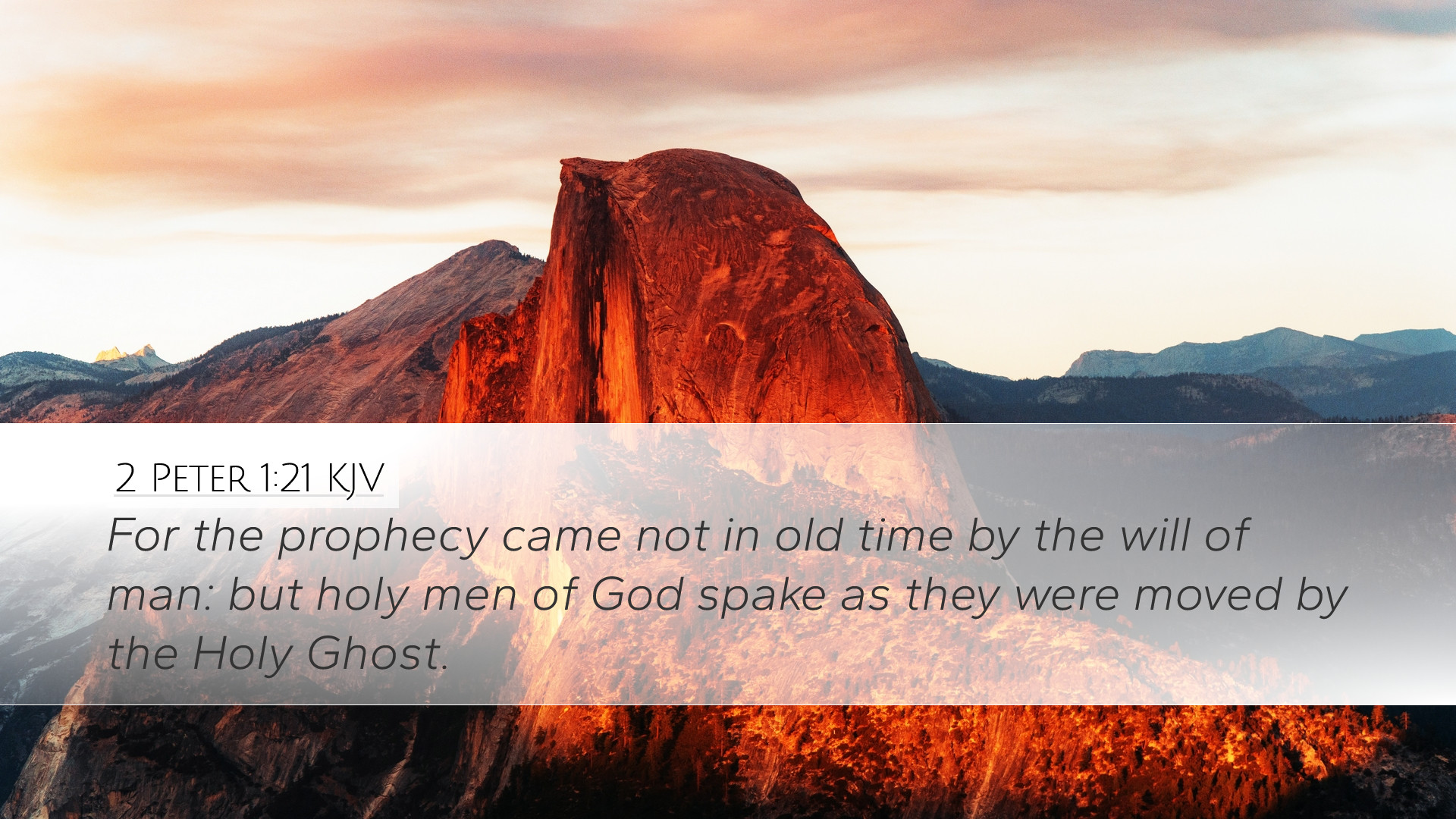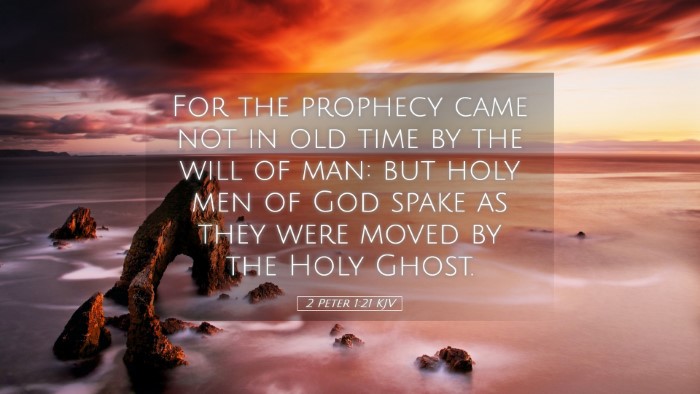Old Testament
Genesis Exodus Leviticus Numbers Deuteronomy Joshua Judges Ruth 1 Samuel 2 Samuel 1 Kings 2 Kings 1 Chronicles 2 Chronicles Ezra Nehemiah Esther Job Psalms Proverbs Ecclesiastes Song of Solomon Isaiah Jeremiah Lamentations Ezekiel Daniel Hosea Joel Amos Obadiah Jonah Micah Nahum Habakkuk Zephaniah Haggai Zechariah Malachi2 Peter 1:21
2 Peter 1:21 KJV
For the prophecy came not in old time by the will of man: but holy men of God spake as they were moved by the Holy Ghost.
2 Peter 1:21 Bible Commentary
Commentary on 2 Peter 1:21
Verse: For the prophecy came not in old time by the will of man: but holy men of God spake as they were moved by the Holy Ghost.
Introduction
This passage, found in the second epistle of Peter, provides a profound insight into the divine nature of prophecy and the inspiration behind the holy Scriptures. It emphasizes that the origin of prophetic words is not human ingenuity but divine action. This commentary synthesizes insights from revered public domain theologians such as Matthew Henry, Albert Barnes, and Adam Clarke to elucidate the significance of this verse for pastors, students, theologians, and Bible scholars.
Contextual Background
Peter, addressing a community of believers, sought to combat false teachings and instill a deeper appreciation for the spiritual foundation of faith. This verse serves as a vital apologia for the authority of Scripture, underscoring the role of the Holy Spirit in guiding the authors of the text.
Insights from Matthew Henry
Matthew Henry emphasizes the following key points:
- Divine Origin: Henry asserts that true prophecy does not originate from human desire or effort but is a product of divine will. He notes that "the will of man" is an inadequate source of spiritual truth.
- Role of Holy Men: He highlights that God appointed "holy men," those set apart for His purpose, to be spokesmen. These men were inspired and moved by the Holy Spirit, which ensured the integrity and truth of their messages.
- Reliance on the Holy Spirit: The phrase "moved by the Holy Ghost" signifies a compelling force acting upon the prophets. This movement is not merely an external influence but an internal spiritual impetus that shaped their revelations and writings.
Insights from Albert Barnes
Albert Barnes provides additional theological insights:
- Contrast with Human Prophecy: Barnes draws a clear distinction between divine prophecy and human foretelling, stating that the former is devoid of personal ambition or preference, grounded purely in divine revelation.
- Authority of Scripture: He emphasizes the necessity of understanding Scripture’s divine authorship. Barnes reinforces that it possesses an authority that transcends human reason, offering believers a solid foundation for faith.
- Historical Context: Barnes contextualizes prophetic testimonies, citing that while many false prophets emerged, true prophecy remained solely under divine governance, reinforcing the need for discernment in the church.
Insights from Adam Clarke
Adam Clarke’s commentary offers a nuanced exploration:
- The Nature of Prophecy: Clarke posits that prophecy encompasses both prediction and teaching, establishing a broader definition that underscores its significance in guiding believers toward truth.
- Implication of Inspiration: He discusses the term "inspiration," suggesting that it involves not only the communication of divine truth but also the active involvement of the Holy Spirit in the thoughts and words of the prophets.
- Historical Integrity: Clarke points to the continuity of prophetic messages throughout the ages, arguing that they are woven together in the larger narrative of God’s revelation, demonstrating the unity of Scripture.
Theological Implications
The implications of 2 Peter 1:21 are manifold:
- Authority of the Scriptures: This verse vests authority in Scripture as divine in origin, challenging interpretations that undermine its truthfulness.
- Role of the Holy Spirit: It elucidates the ongoing role of the Holy Spirit as an active agent in both the inspiration of Scriptures and the illumination of understanding for the believers throughout the ages.
- Encouragement for Believers: For pastors and theologians, this verse serves as a reminder to approach Scripture with reverence, recognizing its origins and the divine purpose it serves in the life of the church.
Conclusion
In conclusion, 2 Peter 1:21 is a robust affirmation of the divine inspiration of Scripture. The insights from Matthew Henry, Albert Barnes, and Adam Clarke enhance our understanding of this crucial truth, encouraging deeper study and appreciation of the Holy Word. As believers, recognizing that the Scriptures are divinely inspired empowers us to engage with them faithfully, trusting that they are a direct channel from God to humanity.


